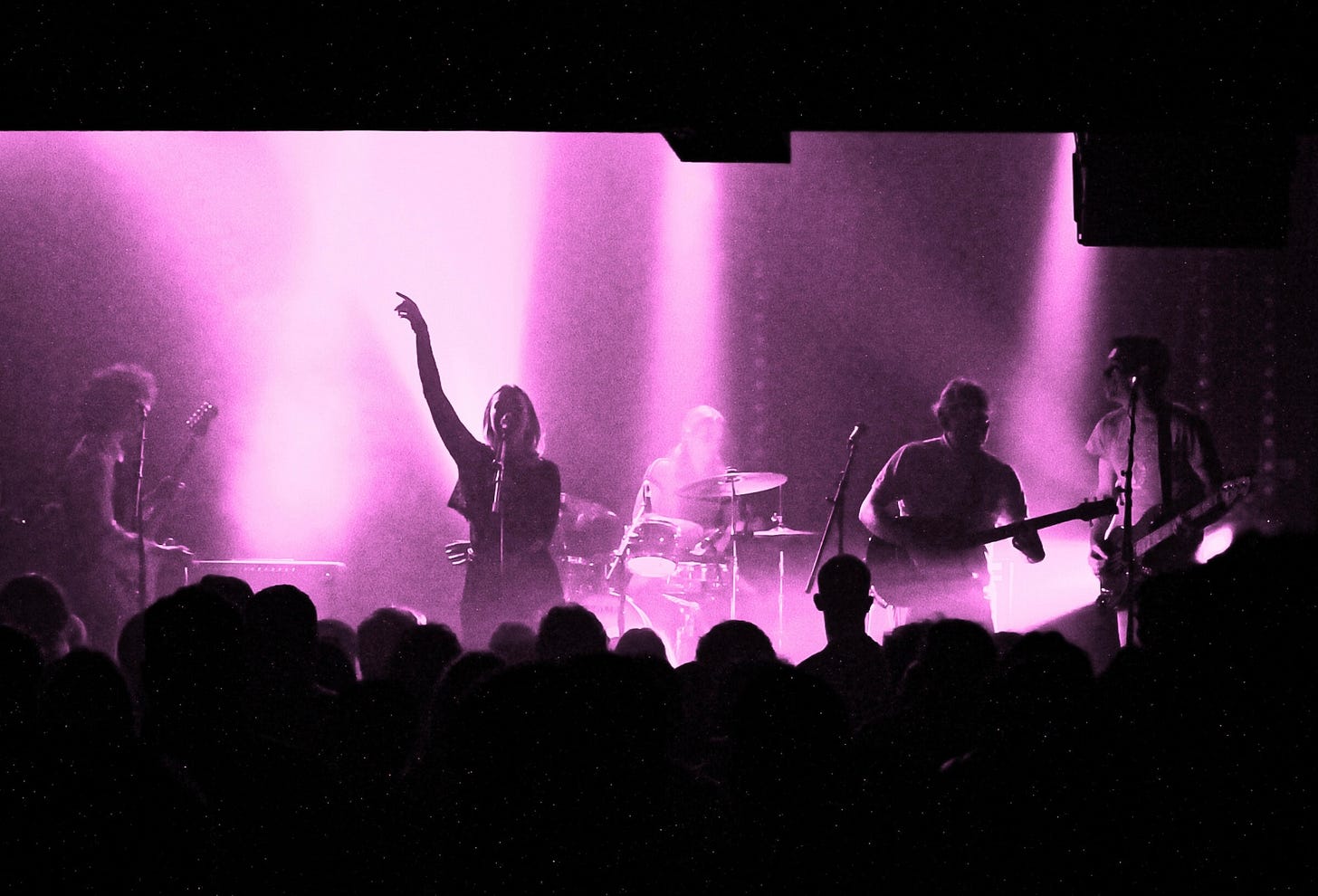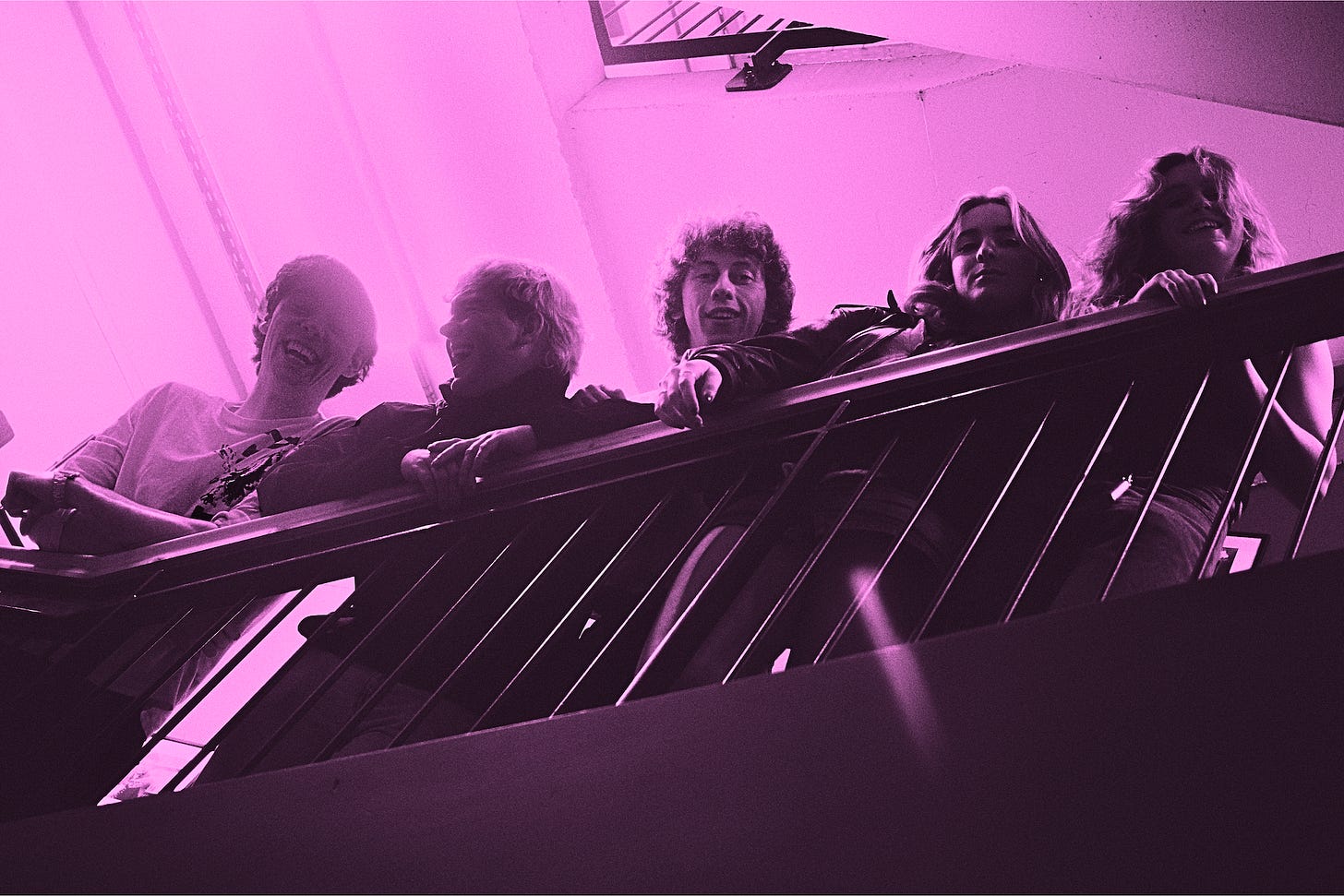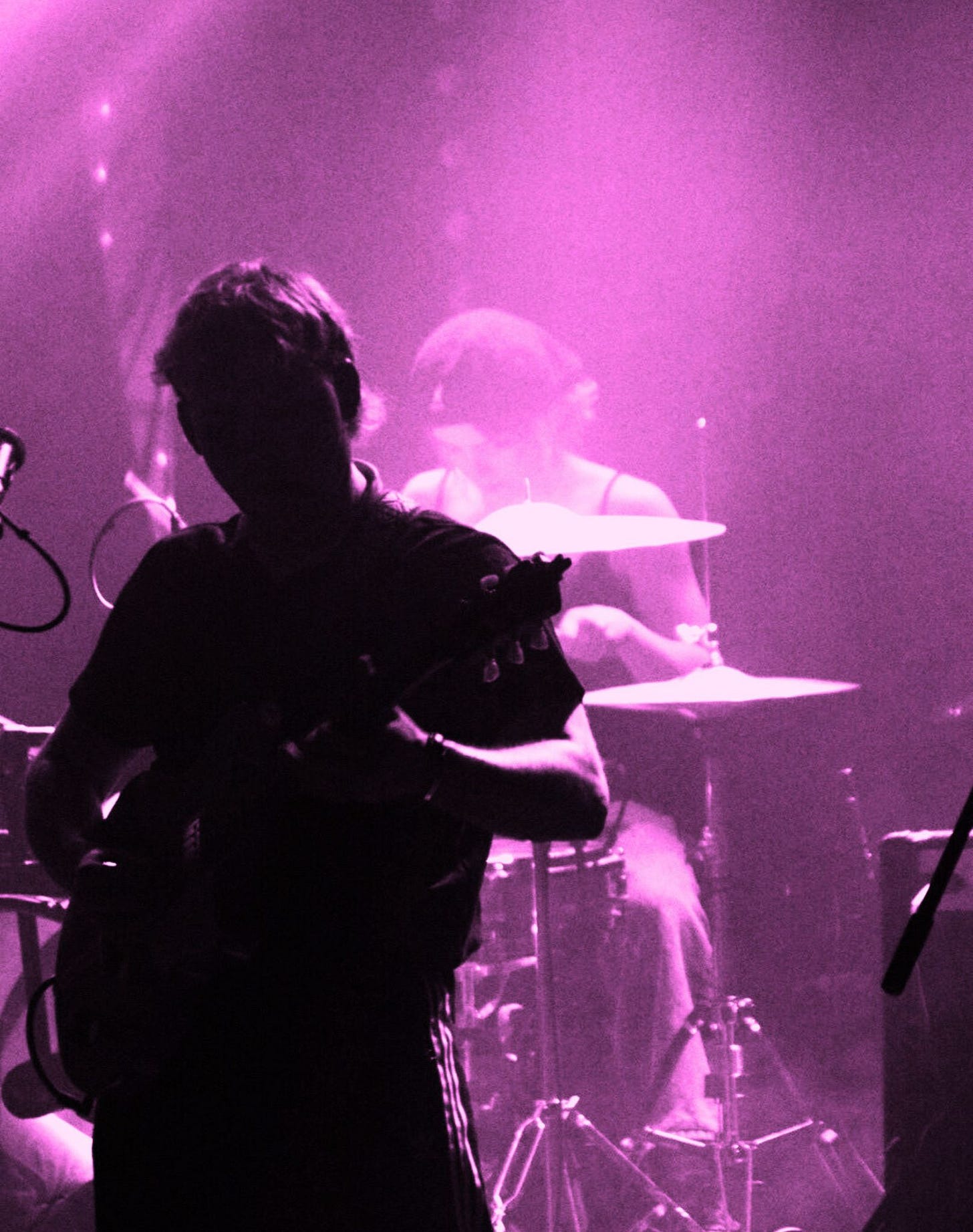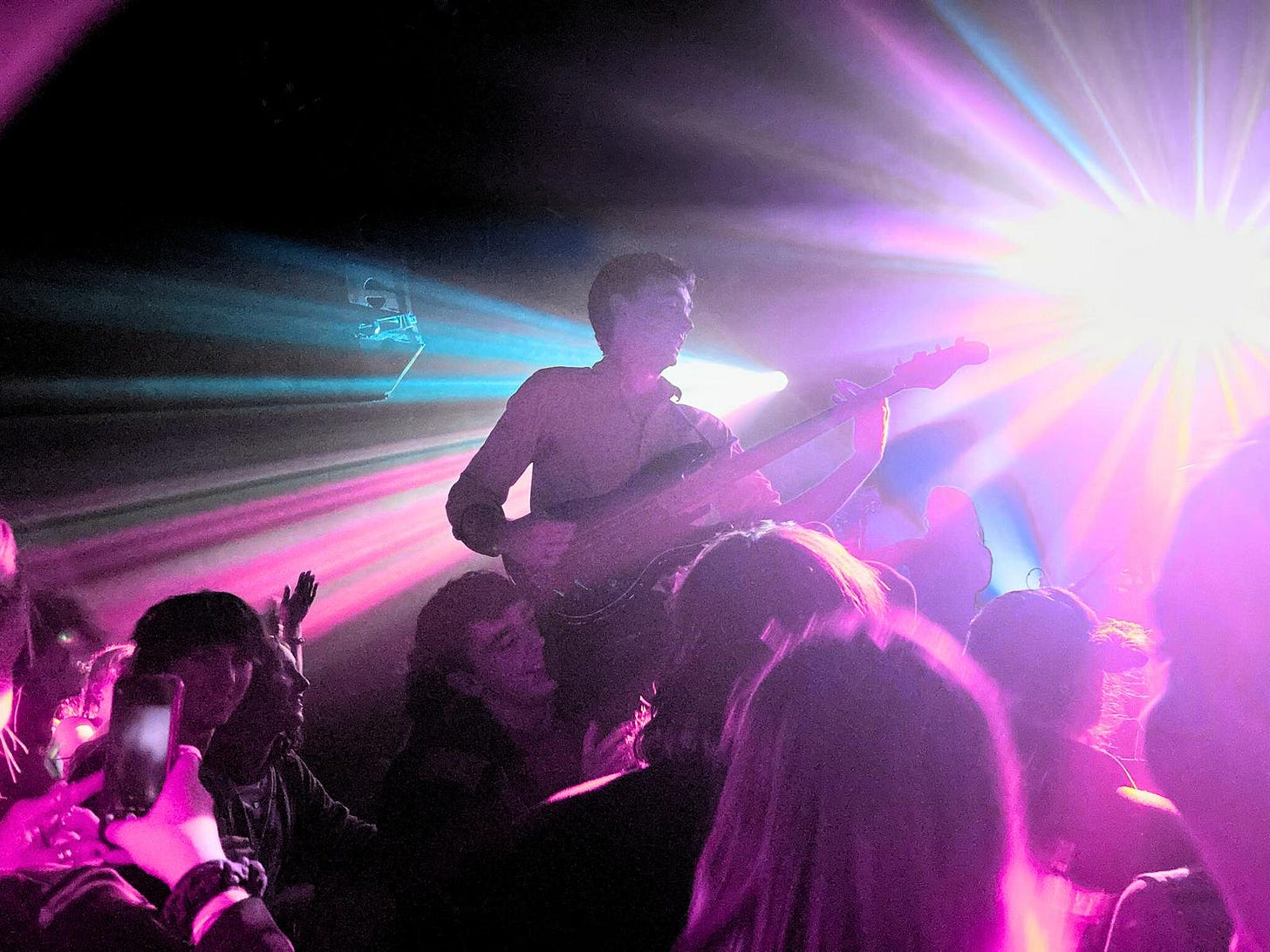“Bring Back Having Fun at Gigs”: An Interview with BABYRAT
Cork pop supergroup BABYRAT talk serendipitous origins, confrontational lyricism, and “ratmania”.
Cork’s hottest new supergroup is BABYRAT, a five-piece “bitch-pop” outfit who have taken the local music scene by storm since their debut in December 2024. Comprised of vocalist Zoe “Mother Rat” Callanan, guitarists Jamie “Jamo Rat” Kierans and Matthew “Chewie” Lucas, bassist Cormac “Tarmsy” McCarthy, and drummer Aela “Diva Rat” Lawler, BABYRAT have established themselves as one of the city’s most exciting up-and-coming acts, especially after their two electrifying performances at UCC’s Battle of the Bands. On a Thursday evening in March, I sat down with Zoe, Jamie, Matthew, and Cormac in Cork’s Abbey Tavern, eager to discuss their origin story, their vibrant live performances, and their plans for the future.
The story of how BABYRAT came to be is a long and complicated one. The seeds were planted in the summer of 2023, but Jamie notes, “it’s only now we know that’s what it was.” Several of the members were involved in other projects at the time: Iris for Zoe, Staff Party for Jamie, and Kane’s Basement for Cormac, and they knew each other from playing gigs together within the tight-knit local music scene. “Jamie used to ask loads of people to do songwriting with him,” Zoe explains. She and Jamie had previously written songs together in a group context for Iris, and she “always thought our songwriting bounced off each other so well.” One day, they went up to Blackpool Rehearsal Studios, and the idea for a song “poured out of us,” Zoe remembers. That song was “First to Know,” now one of BABYRAT’s upcoming singles, although they couldn’t have guessed at the time where the song would lead them.

Afterwards, Zoe sent Jamie a playlist of seven or eight demos she had been working on, but they didn’t necessarily intend to start a band. “There would be times where I was like, ‘I really want to start doing other projects,’” Zoe recalls. “Then Jamie would be like, ‘I don’t think I want to be in a band ever again.’” “From my perspective, at this point, I’m filling in for Staff Party,” Matthew adds. During one car journey to a Staff Party gig, Jamie played the demos he and Zoe had been working on for Matthew, thinking that Matthew could get involved too, but nothing came of it - not until late March 2024. “Zoe was softly talking about the idea of doing her own music aside from Iris,” Jamie remembers. “Like, ‘I have some other songs I did myself that I might do elsewhere.’ And you didn’t tell anyone and didn’t go about wanting to do anything.” Until fellow Cork band MDR “randomly” asked Zoe if she wanted to open for them at their Cyprus Avenue headliner. MDR’s lead guitarist, Ken Buckley, asked Zoe if Iris would open for them, but when she said they weren’t free, he asked if she wanted to play a solo set, aware that she was working on her own music. To which Zoe replied, “Fuck it, go on so.” She originally thought, “I’ll go up with an acoustic guitar and I’ll belt out some of the tunes that I wrote. And then I kinda sat with that, and I was like, ‘Fuck it, I’m gonna get a band in.’ So I asked Jamie.” “I said I’d do it, but I’m not doing it if Chewie Lucas isn’t doing it,” Jamie interjects. “He was like, ‘I’ve never worked with someone so well on guitar, and I think he’s the right call,’” Zoe remembers. “Matthew was my favourite guitar player for years,” Jamie explains, after he and Matthew played a gig together back in 2022 with their former bands (Staff Party and Fruit Flies respectively). Zoe then recruited Omar Aftab on bass and Neil O’Connor on drums, and they put together a seven-song set, four of which (“Roses”, “First to Know”, “Tic-Tac”, and “Realise”) remain in the BABYRAT set today.
The Cyprus Avenue gig went so well, Zoe reflects, that “it brought Jamie out of his opinion of never wanting to be in a band again! He was like, ‘I would do it,’ and then I was like, ‘Okay! I’ve got him! I’ve been waiting for this moment.’” She asked the band if they’d accompany her at her college end-of-year solo recital a few weeks later, and they all agreed. So they did the solo recital, and, Zoe tells me, “we fucked shit up. I was giving it my all. And it was just two people watching. Two lecturers.” The performance was such a success that she won an award for it, Jamie points out. “Then kinda nothing happened that whole summer,” Zoe recalls, though she, Jamie, and Matthew were determined not to let those two performances be the end of it. A few months later, however, line-up changes in one of her other projects motivated Zoe to finally pursue her solo project with purpose. Around this time, she explains, her dad - aware of her passion for music and having heard rough recordings of her solo work - had given her recording time at Wavefield Recording Studios in West Cork for her 21st birthday, which she decided she had to use for her solo project. I can’t help but notice how the BABYRAT origin story is full of serendipity; after deciding to focus on her solo music, Zoe called Jamie and Matthew to invite them to work on it with her, and almost immediately after, the two lads coincidentally ran into each other out and about, and discussed the phone calls they’d both had with Zoe. But with Omar having moved abroad and Neil busy working on his PhD, she was missing a bassist and a drummer. Having heard from a friend about “really fucking cool” drummer Aela, Zoe invited her to jam on this solo project. And after remembering that Cormac and Omar used to send demos back and forth, Zoe and Jamie realised Cormac would be the perfect fit as the group’s bassist. “I don’t want us to get a bass player who plays bass. I want someone who either plays guitar or other instruments, and they’ll figure out how to play bass,” Jamie recalls saying. The way the band tell it, their origin story plays out like the “getting the gang together” section of a heist film - a group of people, each with specific skills, coming together for the ultimate project. It’s so easy to get caught up in the narrative; they tell this story so passionately that I also come to see all these individual moments as significant.

By this time, the project already had its name. “There’s this story where I went down to Wavefield Studios in the summer,” Zoe tells me. “And my dad also plays in bands, he went down the week before. And he has this RAT pedal. So it’s a pedal called a RAT, it’s a distortion pedal. And Brian [the producer at Wavefield] and my dad were making all these jokes about how my dad’s really precise about where his settings are on his RAT pedal.” When Brian emailed Zoe’s dad to say that he had a band coming in with two RAT pedals, he replied, “That’s my daughter’s band. We call her Baby Rat.” Soon after, her dad suggested Baby Rat as a name for her solo project. “I was so picky with names,” she remembers, but she thought, “That sounds so cool. Baby Rat is sick.” She approached the group’s first rehearsal thinking, “I’m gonna be Baby Rat. And I’m gonna have this band behind me.” But after the five of them jammed together, she realised, “I don’t think I’m Baby Rat. I think we’re all BABYRAT.” “To be fair, after a few rehearsals, we just had an energy straight away,” Cormac notes. Zoe remembers the group leaving their first rehearsal and all agreeing that “everything has just fallen into place, in the weirdest way possible. It feels like everything [in the] last three years has led to this project. Which is crazy.”
While they were already planning to record “Roses” and “First to Know” at Wavefield, Cormac thinks that what “galvanised” the band was securing one of the support slots for The Love Buzz’s Cyprus Avenue headline gig in December. “It was such a ballsy move, to have never ever played a gig, to be like, ‘Can we support you in Cyprus Avenue?’” he laughs. Zoe saw the gig announcement and messaged The Love Buzz with a list of the band members and some recordings from one of their rehearsals. “They weren’t even demos,” she points out. “It was the shittiest thing ever.” But The Love Buzz responded by referring to their music as “power pop bliss”, and the slot was theirs. “I dreamed of supporting The Love Buzz when I was younger,” Zoe reminisces. “It’s like the dream support, as an upcoming Cork band, to get.” They made an Instagram account specifically for the gig, but then The Love Buzz asked them for photos - and they didn’t have any. “We texted them being like, ‘Yeah, we did a photoshoot. We’re waiting to get them. We’re getting them tomorrow,’” Jamie tells me. “And I rang my friend Rory. I was like, ‘Rory, you gotta come take pictures of me and the band.’” That evening, as Zoe was out with her friends for College Christmas and Cormac was in the middle of his shift at a burrito place, they quickly did their photoshoot. “And the pictures fucked,” Cormac says. “They looked so good.”

With their debut gig coming up, BABYRAT started writing more songs. Once they were all in a room together, Jamie recounts, “straight away, there was contributions from everywhere. And I think it’s very important to know this - I didn’t believe people could write music together. In most of my favourite bands, it was always someone steering the ship.” But there were multiple encouraging sessions early on, the band tell me, where one of them brought one piece of a song - a few guitar chords or a lyric - and everyone else kept adding to it until the song was fully developed in just a short time. They point to “Sweetheart” and “Flowers” as particular examples of this songwriting process. But it’s the origin of their upcoming single “Talk Talk” they find the most surprising. The day before they were due to record at Wavefield, Zoe and Cormac came into the rehearsal late to hear Jamie playing a captivating guitar riff, which Matthew and Aela then started jamming on. Inspired by a story she had just heard about “a past friend of mine talking loads of shit about me”, Zoe jumped in with the song’s furious opening line: “You said I’m going nowhere in the bathroom stall.” They spent about twenty minutes jamming it before moving on, but it stayed with them: at Wavefield the following day, Jamie and Matthew continued playing the riff between takes. Producer Brian was immediately taken with it and encouraged the band to record it as well as “Roses” and “First to Know”, the songs they had planned, but Jamie and Matthew were hesitant. “I didn’t consider that we’d written a song,” Jamie insists. “Our thoughts were reasonable. We were like, ‘We’ve come to record two and we’ve planned them. And we need to get them right.’” But Zoe, confident in the song and with the lyrics entirely written, told them, “‘Just trust me. Just let me do a vocal take and then make up your mind.’ And then we went to town on it and it was fucking class.” The “Talk Talk” recording turned out incredibly well, and considering how much audiences already enjoy it, I think it’ll be a hit when it’s released.
Needing one more song to fill their set, and after starting a Christmas song (“I don’t think we were ever gonna do that Christmas song,” Cormac protests), they quickly wrote “Nature of the Game”, which then became the “crowd favourite of the night.” It continues to be a success at every gig the band play; they encourage the audience to sing along to the lines “I don’t chase, I just attract / ‘Cause that’s so BABYRAT”, inevitably winning over anyone who’s not already been drawn in by their irresistible energy and charisma. “The great thing about a deadline as well is that you have to work on your instincts,” Cormac says. “You’ve no time for second-guessing yourself. You always have to go with what feels right, and oftentimes, if you’re in the moment, what feels right is the best thing.” Jamie agrees, pointing to how they added “Anybody Else” and “Pretty Little Lies” to their now ten-song set in advance of supporting Little Known at the Roundy in February. Having to write songs for an upcoming gig is “not fearful for us,” he reflects. “It’s an excuse to get more fucking bangers into the room.”
When I ask about the band’s influences, Matthew immediately mentions The Strokes as a significant inspiration for all of them, especially on their arrangements. “The whole stereo, double, switching between lead and rhythm [guitar],” he says. “No lead guitarists. Just guitarists,” Jamie adds. Matthew explains that they’re conscious of ensuring that there’s “purpose to each part” - nothing is extraneous or merely filling space. “If you are watching us and you listen to any instrument, where it be one of the guitars, bass, the vocals, or the drums, there’s something interesting and worth listening to and worth picking up on,” Zoe points out. “We take pride in arranging,” Jamie says. “Sometimes, a chord could have three or four notes and instead of both of us doing that, we might play two each. And it takes two of us to make the chord.” They also mention Olivia Rodrigo’s influence on their sound. “I love what Olivia Rodrigo has done with pop music,” Zoe says. “Her second album is fucking class, the edginess of it.” When it comes to writing lyrics, Zoe’s always been inspired by “confrontational lyricism that doesn’t shy away from things.” She hopes that some audience members will see themselves in her lyrics. “I just want - if someone in the crowd has ever mistreated someone, they’re like, ‘Fuck. I shouldn’t have done that,’” she says. “Even if I’m confronting someone in my head, I want everyone who’s been in that situation to feel confronted again.” In this sense, as well as in her vocal style, she’s influenced by Paramore. “Going from soft verses to these big choruses is something that I was always afraid to do in other projects,” she tells me. “I feel like it’s only since I’ve started doing my own stuff [that] I’ve found that my voice can actually go to those places and hit those levels. Which is crazy. I sing and I’m like, ‘How did I not know years ago that I could do this?’”
“A blend of The Strokes, Olivia Rodrigo, and Paramore” would be a helpful starting point to describe BABYRAT’s sound, but I’m intrigued by their descriptor for themselves: “bitch-pop”. “We are pop music with a bit more attitude,” Zoe explains. “I find it really difficult to write nice songs. If I’m angry about something, I have to turn it into music. The ‘bitch-pop’ comes from when I’m delivering those words, I have to deliver it as if the person I’m singing about is in front of my face.” “We just make pop music that’s wearing rock clothes,” Jamie adds. But for as much attitude as they bring to their lyrics and their performances, they’re completely confident in the pop music they make, even if it might not be trendy right now to visibly enjoy yourself. Zoe points to bands such as Fontaines D.C., who, exciting and enjoyable as their music is, are “starting this trend, almost, that it’s cool to be moody.”
BABYRAT’s ethos is the complete opposite: “Bring back having fun at gigs, dancing at gigs, singing your heart out to the lyrics because you can relate to them in whatever way tends to your needs.” This sentiment shines through in every second of their live performances, in how they jump around on stage, how they engage with the crowd, and how Zoe sings with such emotion that you feel she means every single word. BABYRAT’s energy and enthusiasm are refreshing and as infectious as their melodies. Their songs are so catchy that you find yourself singing along to the second chorus of a song you’re hearing for the first time, having picked it up immediately. At their gigs, it’s easy not to feel self-conscious about dancing and singing along since the band themselves are clearly having such a great time. It’s also cathartic to scream these lyrics along with the band (the line “I’m not trying to fuck you” in “Flowers” is particularly fun). I love the communal experience of a gig, realising that you’re sharing in this music with everyone else in the room, audience members and musicians alike - and I feel that sense of community so viscerally at every BABYRAT gig.
A sense of community is front and centre among the BABYRAT members too. “Before every gig, we all get sprayed with Jamie’s cologne,” Cormac tells me. Well, it’s actually two colognes. “When we get to the green room, it’s Chill Zone,” Zoe says. “And then, before we go on stage, we all stand in a huddle, and I spray Energy Drive into the air,” Jamie continues. “And it washes over all of us.” As a result of this ritual, they’re “all linked up then on stage.” But that’s evident without knowing this backstory. The band members’ chemistry is as vibrant off-stage as it is on-stage; they’re all on the same wavelength, seamlessly continuing each other’s anecdotes. But although BABYRAT are such a close-knit group, I wonder what it’s like for Cormac and Jamie to play different roles in this band after spending years as the frontmen in their previous bands. “It is the biggest relief,” Cormac admits. “What’s great fun is - because I never played bass before in a band at all, it was a great challenge to have to learn a new instrument and learn how to play it in a band context. And just because you’re not singing doesn’t mean you can’t have fun with it.” BABYRAT is unique, he says, because it’s so collaborative. “It’s such an enjoyable process, because we all slot in so well. It’s like we’re all part of the same unit.” Jamie shares a similar sentiment. At first, he says, “I was worried I was gonna miss my old songs. Because I had so much pride and joy in all the work I did before, and I really loved being a frontman, and I think it felt really central to everything I did. My life revolved around the fact that I was a frontman.” But ultimately, he realised that the BABYRAT project brought him so much joy that it didn’t matter what role he played in it - that “if I have an excuse where I get to be around with my best friends playing music, it doesn’t matter what I’m doing really.”
If BABYRAT brings a thrilling change for Cormac and Jamie, what does it bring for Zoe, now the sole frontwoman of her band? In a way, it’s the fulfillment of a lifelong dream. “To be honest, I always did dream of being a frontwoman, since I was so young,” she confesses. “I used to, every night, put in my headphones, from the age of nine or ten, stand in front of my mirror, and pretend I was on stage. It’s all I used to do when I was younger. I still do it. Before a gig, I put our songs on in my headphones, and I act out how I’m gonna act out in front of a crowd.” Each BABYRAT gig, then, is like a tribute to her younger self, who “always idolised frontwomen in bands.” She also points out the difference not playing an instrument in this band makes to her. In other bands, she has always played bass as well as singing, and the freedom she has in BABYRAT to run around the stage unencumbered brings with it a visible change in her performance style. In Iris, Zoe explains, the band’s focus was always on collaboration between all four vocalists, ensuring that everyone was equal and they all got their moment to shine. This spirit of collaboration was one of the reasons she loved her time in Iris, because it was “so different” to perform with her best friends, all four of them in the front line on the stage. She brings that experience to BABYRAT in how she interacts with her bandmates, who, she notes, “play just as much of a vital part as I do” in how they engage with the audience. “I feel like I’m delivering the lyrics, and delivering a story, but the story is nothing without the rest of my band,” she reflects.
I’m always curious to learn which of a musician’s songs is their personal favourite, and BABYRAT’s answers don’t disappoint. For Matthew, it’s “Roses”, the song the band always open their set with. It’s my favourite too. I think it’s a perfect pop song, with its incredibly catchy chorus, interlocking guitar parts, punchy drumbeats, and lyrics that are amusingly rooted in Cork City (“The girls from the Roundy go to Bróg to dance / And the girls from the Roundy don’t give second chances,” Zoe informs us). It’s a lively burst of energy that encapsulates BABYRAT, and I can’t wait for it to be released as a single. For both Zoe and Jamie, though, it’s “Anybody Else”. Right now, it’s even Jamie’s favourite song in general. “I listen to it all the time,” he says. “I love playing it. I love the sound of it, and I love rocking it out.” Zoe is similarly enthusiastic: “The chorus is so bitchin’, and Jamie’s riff is so fucking cool. It goes into this big belt section at the end, and then it just strips away to nothing.” The song’s “gut-wrenching” lyrics are some of her favourites, which tell the story of a narrator who feels trapped in a relationship with her subject. The image of the subject “follow[ing] [her] footsteps all around town” is a particularly striking one to me. The song itself is so infectious and such an impactful showcase for Zoe’s voice that you might even miss the story that unfolds, at least until the end, when the music mostly drops away, and Zoe gives what she thinks of as “the final piece of the puzzle” of this heartbreaking story: “Anybody else but you could make my life feel worth their while.”
“Anybody Else” is a great demonstration of how important lyrics are to the BABYRAT project. Their lyrics are usually quite personal and often angry, and it’s always thrilling to watch Zoe scream her heart out as she sings them. I particularly enjoy the fed-up attitude of “Sweetheart” (Cormac’s favourite song), in which Zoe admonishes an indie boy who thinks he’s “so cool now” because he paints his nails and plays guitar in a “shitty band”. In the chorus, she criticises him for “telling all the girls that they’re so lovely / That they’ve been your favourite for a while”, in a clever allusion to “Favourite” by Fontaines D.C. (she later pointedly refers to “the Fontaines poster in your bedroom”). But perhaps the angriest song, “Pretty Little Lies”, is also maybe the most cathartic, you sense for Zoe as well as the audience. She explains that the song - in particular, the lyric “You sing along to all my friends’ songs / As if they could mean something to you” - is about “being frustrated from someone invading my space in the music scene, that was wholly my space while I knew this person. I’d be going to gigs, seeing them in the front row, singing my friends’ songs, and I know that they haven’t talked [to them], never liked that kind of stuff. So that’s where that came from. It came from a space of anger - you can hear it in the song, it’s like: ‘You’re in my space.’ This is my space, this is my circle. Stop invading.”
While BABYRAT are bringing a fresh new energy to the Cork music scene, the scene itself is also shifting. “I think it was in a weird phase last year, where bands were either falling to the ground or getting signed,” Zoe reflects. “And it was a really hard phase for new bands to break in. But right now, there are a lot of new bands breaking in, which is really hopeful.” The state of the Cork music scene in 2024 stood in stark contrast to previous years, the band say. “2022 was crazy,” Matthew reminiscences. “That was so fun. Covid just ended, and everyone was in a band.” “The start of 2023 was insane,” Zoe continues. “So many bands. You were in Fred’s every week, the bills were like, Cliffords, Pebbledash, Staff Party. The bills were crazy, you’d never see them now.” I mention that I have a poster from a headline gig Pebbledash played in An Spailpín Fánach in March 2023 with support from Cliffords - it’s a special document to have, now that both bands have undergone so many changes and achieved so much in the two years since. Zoe, it turns out, also has a poster from this gig. It makes me think about how so many people’s stories in the Cork music scene are intertwined, and I believe it when the band tell me that it “feels like every path that we’ve all been on separately has led to this moment.”
Now, Jamie notes, “there seems to be real excitement for new stuff.” “Something that’s breaking the mould a bit,” Zoe adds. “I think people are screaming out for fun pop music. You see the appeal with Cliffords - people love Cliffords because their songs are so relatable and you can sing along to them, they’re catchy, and people are itching for more stuff like that.” It’s apparent in the fervent response BABYRAT have received from the scene since their debut. As Jamie says, “Ratmania is huge.” And the ratmania they experienced at the Battle of the Bands final makes it their favourite gig they’ve played to date. “I fucking could not get over the amount of people who were standing in front of us,” Zoe says. “Homemade merch, signs, people wearing pink,” Jamie remembers. “People we never met before, singing words to songs that aren’t released. Those are all big points that made it really special.” They’re all very appreciative of the support they’ve received so far, although they’re conscious that it helps that people are already familiar with them from their previous work. “It’s probably annoying for other bands that we just came out of nowhere because it’s a supergroup, and we just like, skipped the queue,” Zoe laughs.

Even though the band is barely five months old, I feel confident that it’s BABYRAT’s world, we’re just living in it. They already have three singles recorded, which will be released soon. Windmill Lane Recording Studios have also recruited them, so even more recorded music will come from BABYRAT before too long. If you want to see them live, they support Dream Boy at the Grand Social on 15th April and play at Féile Solas on Whiddy Island in June. They have even more exciting things coming, but they can’t reveal them quite yet. What they can reveal, though, is that their “ambition is large.” They have their sights set high: recording an album, touring, playing international gigs, hearing audience members sing their guitar riffs back to them, writing songs that are considered classics. Their ultimate dream is to play Glastonbury. And I can’t help but root for them, not only because they couldn’t be friendlier, more welcoming, or more willing to chat to me about absolutely everything. Talking to BABYRAT and watching them perform, I’m struck by a trait that makes them stand out: their earnestness and sincerity. They all care so deeply about this project, which comes through in their performances; their passion for the music and for performing together is always on full display. There’s no pretense with BABYRAT. I’m reminded of Sophie at That Final Scene’s excellent piece “jeremy strong, kieran culkin, and the cost of caring too much”, in which she critiques how “we’ve collectively decided visible effort is embarrassing.” Sure, it might be trendy or “cool” to act as if you don’t care, but I think there’s much more value in what BABYRAT are doing: trying to forge a genuine connection with the people in front of them, who are listening intently to what they’ve created. “It’s fun and cool to dance and enjoy pop music and just like songs,” Zoe says. I’m inclined to agree.








huge! massive! mega, even!
This might be your best article yet Mia!!!!